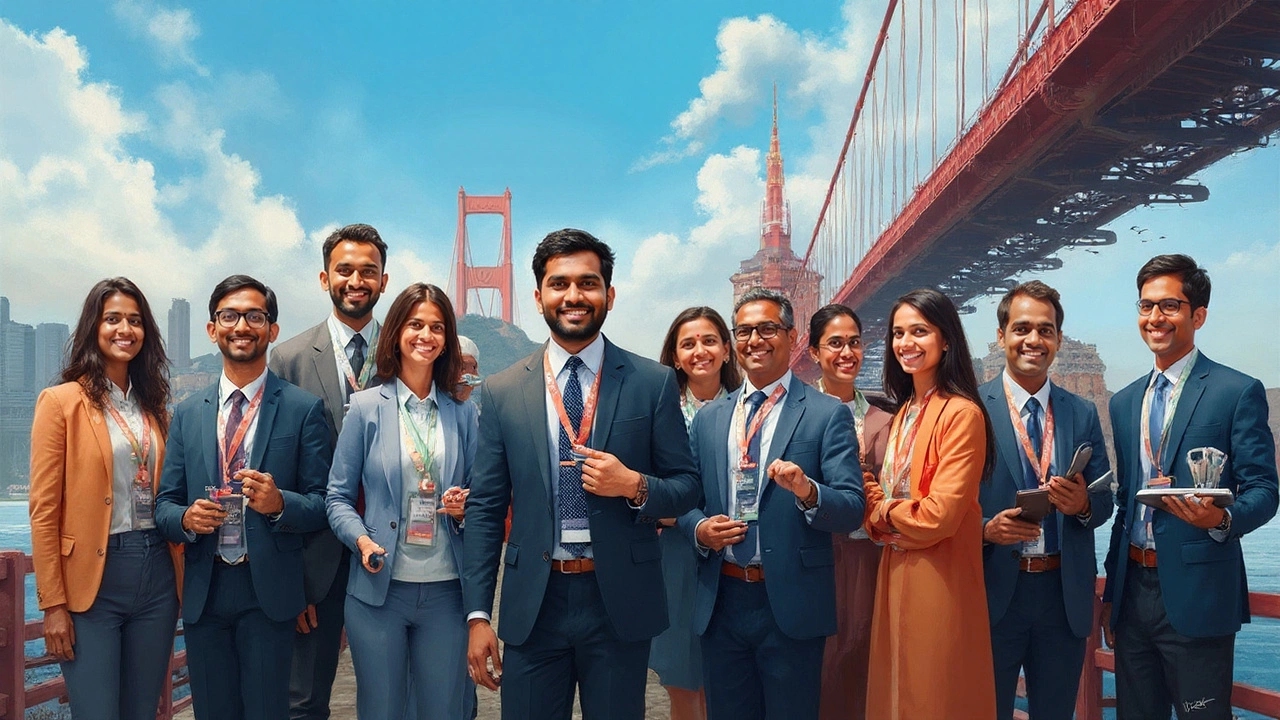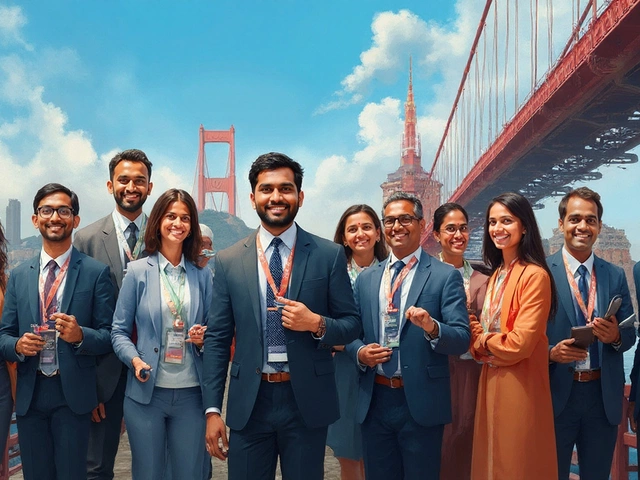Just imagine growing up hearing about how getting into IIT is a dream so crazy, people literally count their luck if their neighbor’s child even cracks the JEE. Fast-forward a decade, some of these engineering whizzes aren’t just names lost in alumni lists—they’re running billion-dollar companies on the other side of the world. Seriously, the US wouldn’t be what it is without a string of IITians shaping the tech industry, investing in world-changing projects, and stirring up competition in every corner. Wondering who these overachievers are, and what helped them leap from Indian hostels to Silicon Valley boardrooms? You’re definitely not alone.
Top IITians Who Changed the Face of US Tech
Let’s get real—if you’ve ever browsed through a list of Fortune 500 tech CEOs, you will spot multiple IIT graduates. Sundar Pichai is the obvious flag-bearer. Born in Chennai and an IIT Kharagpur alum (Metallurgical Engineering, class of ‘93), he went from managing humble product teams to becoming CEO of Google, and later Alphabet. Pichai’s journey isn’t simply about skills; he’s famous for extreme calm in chaos (remember when he handled that US Congress grilling on YouTube’s content policies without breaking a sweat?). Many in Mountain View say his ‘humility’ is a key separator, something rooted deep in the IIT culture of no shortcuts and relentless peer competition.
Satya Nadella is another textbook example. The current Microsoft CEO is a product of IIT’s distant cousin, Manipal Institute of Technology, but several of his core advisors, top engineers, and product chiefs are ex-IITians. Nadella himself often talks about how IIT alumni working around him bring rare problem-solving grit mixed with creative ‘jugaad’.
Arvind Krishna, who took the helm as CEO of IBM in 2020, is a proud graduate of IIT Kanpur (Electrical Engineering, 1985 batch). He’s credited with spearheading IBM’s pivot to artificial intelligence and cloud, ever since Big Blue started losing ground to new-age tech companies. According to Krishna, his IIT training taught him more than coding; it was about dealing with uncertainty—something US boardrooms can’t get enough of.
It’s not all about CEOs. IITians have left deep marks as founders, chief scientists, and venture capitalists. N.R. Narayana Murthy (IIT Kanpur), co-founded Infosys and still spends time advising US-based startups. Rajat Gupta (IIT Delhi) became the first Indian-born CEO of McKinsey & Company, and though his story got mired in controversy, his influence on management consultancy is forever tied to IIT.
Vivek Ramaswamy (IIT Madras), co-founded Roivant Sciences in the US and has become a household name on Wall Street for shaking up the biotech investing world. You may catch his hot takes on American business TV weekly, where he often credits his Indian upbringing for his boldness. Amit Singhal (IIT Roorkee), the man behind Google’s core search algorithms for over a decade, helped shape the way the whole world finds information online. It’s small wonder that US tech giants keep recruiting from Indian Institutes of Technology religiously every recruitment season.
From Campus Canteens to Boardrooms: What Sets IITians Apart
If you ask employers in the US, IITians get picked not just for their grades, but for how they handle wild, ambiguous challenges. Silicon Valley VC Vinod Khosla (IIT Delhi, Mechanical Engineering, 1976 batch, and co-founder of Sun Microsystems) jokes that the IIT interview experience is tougher than most US job interviews. You hear stories of students surviving all-night hackathons, organizing national tech fests, or starting businesses right from their overcrowded hostels—years before they become US household names.
But how do they leap so far? Start with the peer pressure cooker environment. Most IITians entering the US workforce have years of problem-solving experience under their belts. And it isn’t just about technical brilliance; it’s about that survival instinct honed with every impossible exam and resource crunch. Even in big US firms, former IITians often step into firefighting roles right away; they’re used to handling absurd deadlines and working with teams that barely slept for days.
Cultural adaptability is another distinct edge. IITians are often fluent in technical English, aware of global trends thanks to deep library stays, and comfortable with diverse backgrounds. Many share stories of arriving in the US with just a suitcase, but soon finding Indian student networks—something that lightens culture shock and helps build bonds fast at every US university lab, every tech meetup, or even local cricket matches in San Jose.
There’s one more not-so-talked-about factor: humor and humility. You’ll often find US-based IITians downplaying their IIT links. Google’s former engineering VP, Venkat Panchapakesan (IIT Madras) was famous for saying, ‘There’s no IITian arrogance, only IITian anxiety to do better.’ That attitude works wonders in American corporate circles where confidence and approachability matter as much as technical prowess.

Numbers Don’t Lie: IIT Impact in the US Tech Scene
It’s easy to think IITians are just visible because of a few famous names. But numbers show a deeper story. A 2023 report by The Economic Times found that over 10,000 IIT graduates are working in leadership roles in the US, and nearly 40% of tech startups founded by Indians in California’s Bay Area have at least one IIT graduate as a founder or chief engineer. This is staggering considering only 1% of India’s college graduates come from the IIT system each year.
| Name | IIT Campus and Year | Role in US | Known For |
|---|---|---|---|
| Sundar Pichai | Kharagpur ‘93 | CEO, Google/Alphabet | Revamped Google, cloud tech, Chrome |
| Arvind Krishna | Kanpur ‘85 | CEO, IBM | AI, cloud transformation |
| Rajeev Motwani | Kanpur ‘83 | Professor, Stanford & Google mentor | Mentored Google’s founders, algorithms |
| Raghuram Rajan | Delhi ‘85 | Professor, Chicago Booth & ex-IMF Chief Economist | US economic policy influence |
| Vinod Khosla | Delhi ‘76 | Co-founder, Sun Microsystems & Founder, Khosla Ventures | US startup funding, green tech |
| Amit Singhal | Roorkee ‘89 | Google search chief | Revamped Google search engine |
Another little-known fact: More than 25% of Indian-origin CEOs leading US public companies in 2024 are IIT graduates or former IIT professors. Even top-tier venture capital funding has an IIT fingerprint. For example, more than $15 billion in early-stage startup investments since 2018 came from funds founded or co-managed by IIT alumni. If you open a LinkedIn group related to AI, SaaS, or fintech in the US, you’ll see familiar IIT names offering internships, mentoring sessions, or just sharing motivational stories from their own journeys. These networks are goldmines for young Indian technocrats dreaming of similar leaps, so don’t hesitate to reach out for guidance.
Women IITians are now making huge moves, too. For ages, the classic IIT success story was of a male engineer, but the glass ceiling is finally cracking. Neha Narkhede (IIT Bombay), co-founder of Confluent in Silicon Valley, now runs one of the biggest data streaming companies in the world. Women like her are rewriting what an IIT-US story looks like.
How to Follow Their Footsteps: Tips and Takeaways for Aspiring IITians
So what can you actually do to chase a similar journey? First, recognize this: there’s no one-size-fits-all shortcut. Still, some patterns are obvious if you look closely at IITians who’ve rocked the US scene. They didn’t just ace tests—they built resilience by failing, dusting off, and trying different things. If you’re still a student, try working on global, open-source projects. Join campus groups that connect you with US companies and research labs. These cold email connections matter—a Stanford mentor or a Google recruiter often responds better to an IIT grad who’s done something outside class.
Many top IITians say being curious about things outside their comfort zones paid off big time. Rajeev Motwani, the late Stanford professor who mentored Google’s founders, talked about his love for puzzles and side projects during his IIT Kanpur days. He encouraged students to read widely: not just tech journals, but newspapers, economics, even psychology. That broad base is what gave him an edge as a Silicon Valley adviser.
If you’re already working in the US or planning to go, don’t underestimate the IIT alumni network. There are LinkedIn, Facebook, and WhatsApp groups just for IIT grads in every US metro area. Regular meetups, mentorship sessions, and job boards keep fresh arrivals connected and help them snag opportunities that might never be posted openly elsewhere. One practical tip: Jumptart your college experience by seeking internships with US-based companies, and don’t let visa complexity scare you—it’s common for IITians to lean on each other for help with paperwork, housing, and adjusting to American campus life.
For those about to start college, keep in mind: US universities love applicants with a mix of stellar academics and personality. That means, don’t shy away from highlighting leadership in quirky clubs or NGOs. If you’re eyeing the IIT route purely to ‘land in America,’ weigh your passions. The most successful IITians in the US always had a north star: solving real-world tech problems or building products they truly cared about, not just scoring a plane ticket.
And here’s a last thought: There’s always buzz around the ‘IIT badge,’ but it’s how you use that platform—mixing curiosity, hard work, and a willingness to help others along the way—that turns reputation into real impact. As the list of famous IITians in the US grows each year, the best part is knowing that next big name could easily be someone still struggling through their very first IIT semester, unsure, but ready for the ride.


